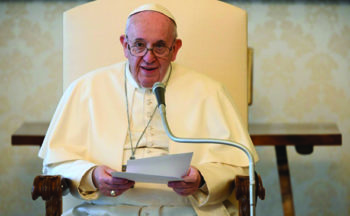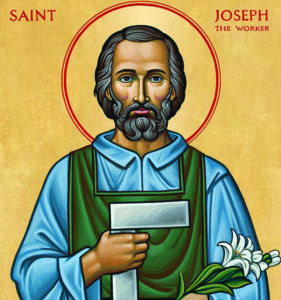Francis Speaks
 The 50th Earth Day
The 50th Earth Day
... is an occasion for renewing our commitment to love and care for our common home and for the weaker members of our human family. As the tragic coronavirus pandemic has taught us, we can overcome global challenges only by showing solidarity with one another and embracing the most vulnerable in our midst. The Encyclical Letter Laudato Si’ deals precisely with this ‘Care for our Common Home’. Today, let us reflect together a little on that responsibility which characterises “our earthly sojourn” (Laudato Si’, 160). We must grow in our awareness of care for our common home.
Made in God’s image
We are fashioned from the earth, and the fruit of the earth sustains our life. But, as the book of Genesis reminds us, we are not simply ‘earthly’. We also bear within us the breath of life that comes from God (see Genesis 2:4-7). Thus, we live in this common home as one human family in biodiversity with God’s other creatures. Made in the image of God, we are called to have care and respect for all creatures, and to offer love and compassion to our brothers and sisters, especially the most vulnerable among us, in imitation of God’s love for us, manifested in his Son Jesus, who made Himself man to share this situation with us and to save us.
The earth never forgives
Because of our selfishness we have failed … to care for the earth, our garden-home; we have failed to care for our brothers and sisters. We have sinned against the earth, against our neighbours, and ultimately against the Creator, the benevolent Father who provides for everyone, and desires us to live in communion and flourish together. And how does the earth react? There is a Spanish saying that is very clear about this. It says: “God forgives always; we humans forgive sometimes; the earth never forgives”. The earth never forgives. If we have despoiled the earth, the response will be very bad.
Standing on holy ground
In today’s celebration of Earth Day, we are called to renew our sense of sacred respect for the earth, for it is not just our home but also God’s home. This should make us all the more aware that we stand on holy ground!
Let us pledge to love and esteem the beautiful gift of the earth, our common home, and to care for all members of our human family. Like the brothers and sisters that we are, let us together implore our heavenly Father: “Send forth your Spirit, O Lord, and renew the face of the earth” (see Psalm 104:30).
Source: Libreria Editrice Vatican, 22 April 2020
On Prayer
There is a voice in human hearts that invokes, louder than any contrary voices. We all have this voice within, a voice that emerges spontaneously, without anyone ordering it, a voice that questions the meaning of our journey down here, especially when we find ourselves in darkness. “Jesus, have mercy on me! Jesus, have mercy on me”! This is a beautiful prayer.
But are these words, perhaps, not sculpted in the whole of creation? Everything that exists invokes and implores that the mystery of mercy find its definitive fulfilment. Christians are not the only ones that pray. They share the cry of prayer with all men and women. However, the horizon can be widened still more -- Paul affirms that the whole of creation “groans in labour pains” (Romans 8:22). Artists often make themselves interpreters of this silent cry of creation, which weighs on every creature and emerges especially in human hearts, because humans are “beggars before God” (see CCC, 2559). A beautiful description of us -- “beggars before God”. Thank you.
Source: Zenit, Pope’s Catechesis on Prayer, 6 May 2020
 Pray to St Joseph the Worker
Pray to St Joseph the Worker
Two months ago, I spoke to a businessman on the phone who asked me to pray for him, because he didn’t want to dismiss any of his employees, and he said this: “… to dismiss one of them is to dismiss myself”. This is an example of the awareness of many, many good businessmen, who protect workers as if they were their children. We pray for them, and we ask Saint Joseph to help us fight for the dignity of work, so that there is work for all, and that it is fitting work, not the work of a slave. Let this be today’s prayer.
Source: Zenit, Homily, 1 May 2020
 Entries(RSS)
Entries(RSS)